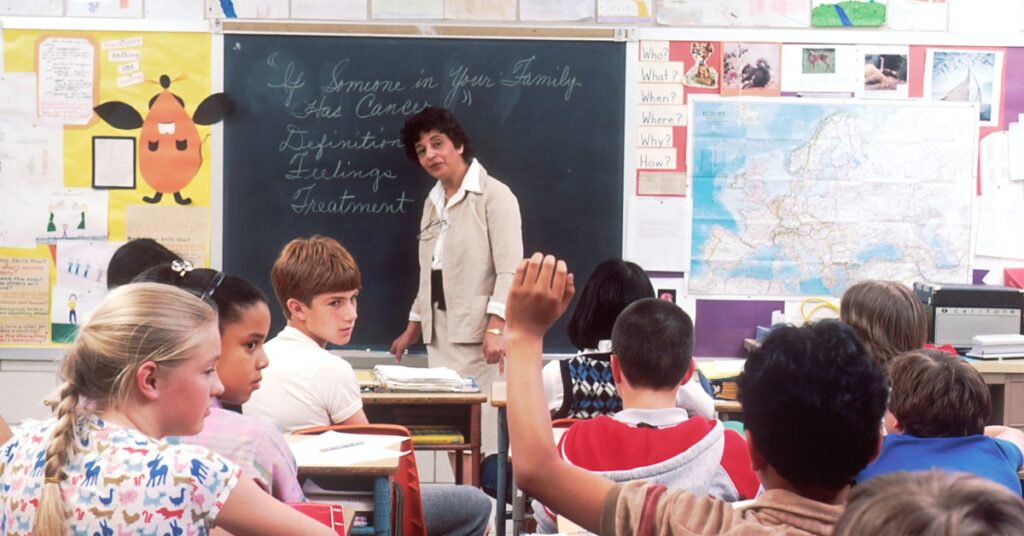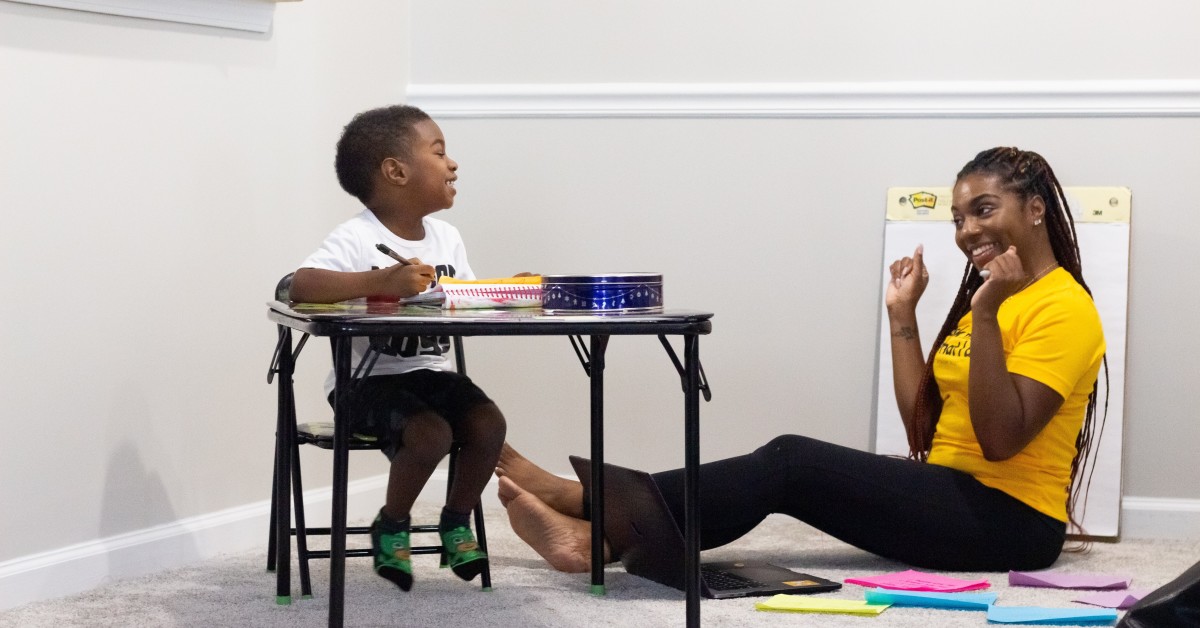
What Do Math Teachers Earn in 2020?
As a math teacher, you may qualify for higher pay [...]

It would be difficult to overestimate the influence teachers have on our lives. More than funding, technology, or standardized testing, teachers impact students’ success, self-image, and satisfaction.
Teachers make the entire education system work. Yet, according to Leila Christenbury, “The teacher, an individual who is crucial to the success of any reform effort, has often been sidestepped, minimized, or even ignored.” Finding the support necessary for teachers to improve their skills and knowledge can be challenging; becoming a more effective teacher often comes down to individual motivation.
Luckily, tools and support are available to those who know where to look. Here are 11 ways to become a better teacher in 2020. Some of them may already be in your repertoire.
Good teachers know how to expand their knowledge base outside of a structured environment. Connecting with fellow educators through social media is an excellent way to do things like share lesson plans, give and receive advice, and learn new classroom management skills.
Sites like Twitter and Pinterest make it possible to meet up with other great teachers. Apps like Feedly and Tagboard help organize information and articles so you can stay informed on developments in education. The ultra-ambitious can even create an international learning environment by connecting their students with others from around the world.
| University and Program Name | Learn More |
|
New York University:
Master of Arts in Teaching
|
|
|
Merrimack College:
Master of Education in Teacher Education
|
At some point, you’ll likely want to earn a master’s degree to continue your teaching career, but it doesn’t just need to be a box to check. Completing a Master of Arts in Teaching, Master of Science in Teaching, or Master of Education degree program allows you to specialize so you can better facilitate student learning. For instance, you may take on a English as a second language (ESL) or middle school education concentration to help a specific group of students. You can even take courses that improve leadership skills to transition into a teacher-leader role.
Good teachers are always trying out new approaches. No one teaching method works for every student, so you should not be afraid to call an audible. According to the Association of American Educators, “not only is [experimentation] the simplest form of enhancing your teaching performance, but it’s also another great way to show your students a side to you they didn’t know existed, keeping things lively and fresh in the classroom.”
It’s nearly impossible to plan anything out perfectly, and sticking to an ineffective plan doesn’t help anybody. Teachers can suffer from perfectionism and become rigid trying to impart what they think is best for their students. A willingness to go back to the drawing board and try something new is an essential teaching skill.
Many schools have mentorship programs for young teachers, which help them develop important skills and get through their first job. Having a good role model is a significant reason teachers stay in the profession. Without that kind of support, they frequently find themselves succumbing to burnout. Even if you are not a new teacher, getting advice from someone with more experience can be beneficial.
Mentorship is a two-way street. If you are an experienced teacher, becoming a mentor is an excellent option. Participating in the teacher training process benefits your career because it improves school culture and creates a positive environment for everyone. It can also help you sharpen your skills by forcing you to articulate your processes and assumptions.
Teachers should always advocate for their students—to school administrators, parents, or even lawmakers. Sometimes this simply means sharpening your communication skills and describing a student’s needs. You might also consider joining a professional organization.
Special education teachers are among the most prominent advocates for their students. Many complete an advocacy certification through the National Association of Special Education Teachers. This certification prepares people to fight for fair education practices for special needs students.
Many advocates are former teachers, so that might be the next step for your career. However, current teachers can also take on advocacy roles. The Center for Strengthening the Teaching Profession (CSTP) program prepares educators to advocate as they teach, and even provides an opportunity to meet with policymakers.
There are eight different learning styles:
Naturally, you won’t be able to cater to each one simultaneously, but you can help create an open learning environment through adaptability and a student-centered teaching style, according to the University of San Diego. This could involve helping students to engage with subject matter through tools like visual aids or teamwork exercises. These skills can be developed through self-study, or as part of a master’s program.
Effective communication with parents is essential to being a teacher. Remember, students don’t spend all their time in the classroom. A good parent is a powerful ally in their child’s education. Scholastic’s Five Keys to Successful Parent-Teacher Communication boil down to establishing trust and keeping in touch. Keep parents informed of behavioral issues from the start and take the time to make decisions regarding a student—not letting a parent force you to make one quickly.
According to the Center for American Progress, “The quality of formal partnerships between teachers unions, administrators, and teachers at the school level is a significant predictor of student performance, as well as performance improvement, after poverty and school type are taken into account.” Opening a communication line between teacher unions and school districts leads to more in-depth discussions about curriculum, advising, and mentoring.
Of course, one teacher does not make this change independently—it happens on an institutional level. However, you can make a start by joining a teacher union, such as the American Federation of Teachers. Being a team player in the union and contributing to relevant discussions is one way to contribute to the process of improving your school.
Everybody who has gone to school has encountered a teacher whose homework assignments were confusing, imprecise, or at the wrong aptitude level. You can make homework and study sessions more accessible with online learning aids like Quizlet or Brainscape, which allow students to learn at home interactively. The learning process doesn’t grind to a halt outside the classroom.
Teachers should also learn how to collaborate with tutors. Sometimes this might involve recommending that a student get outside help. It could also involve helping a tutor understand the student’s needs directly or through a parent.
Many school teachers suffer from burnout. The stress of the job can eventually wear even the best teachers down, sometimes forcing them out of the profession entirely. According to one study, 15 percent of teachers quit every year. More public school teachers express dissatisfaction with their jobs than do private school teachers.
Everybody is at risk of burnout, and taking steps to secure your mental health are important. This could involve:
Spending time on yourself may feel selfish, but it’s necessary. Poor body language and lack of enthusiasm can have an impact on your students. It may sound hard to believe, but staying up all night lesson planning can harm your ability to implement your lessons.
No list about improving is complete without mentioning perseverance. Every teacher experiences moments of doubt. Working through them is one of the top skills you can cultivate. This can be done by reading motivational articles or speaking with fellows who have gone through the same process.
Not all of these tips will be easy to follow. It is vital to give yourself permission to grow and develop. There is no magic switch that turns people into the perfect teacher—mostly because the perfect teacher does not exist. Being an effective one is about progress, not perfection.
This article was originally published in 2019. It has been updated to reflect the most recent data on the subject.
(Last Updated on February 26, 2024)
Questions or feedback? Email editor@noodle.com

As a math teacher, you may qualify for higher pay [...]

The keys to maximizing your income as an English teacher [...]

A series of high-profile tragedies have citizens seeking alternatives to [...]

Students of color perform better when at least one of [...]

You'll improve your knowledge and skill set in either a [...]
Categorized as: Teaching, Education & Teaching